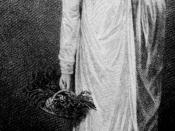Metzger
Mark Metzger
Mr. Schain
English 12 AP Literature & Composition
20 December 2013
The Eternal Struggle of the Conscience
Conscience, the inner feeling or voice viewed as acting as a guide to the right or wrong of one's behavior, controls us. We act according to our conscience, and if we don't, we feel guilt. In Shakespeare's Hamlet, the protagonist Hamlet struggles with his conscience, and the decision of taking action in what may be right or wrong. The play revolves around the conscience and the state of consciousness. "The play's subject⦠is neither mourning for the dead or revenge on the living⦠All that matters is Hamlet's consciousness of his own consciousness, infinite, unlimited, and at war with itself" (Harold Bloom). In analysis of Hamlet and the state of consciousness, we can interpret that Shakespeare may be using Ophelia to represent the physical form of Hamlet's conscience. This is evident throughout the play, especially in the beginning of the play when Laertes talks to Ophelia about Hamlet (Act 1 Scene 3) and when Hamlet frightens Ophelia in her room (Act 2 Scene 1), Act 3 Scene 1, and when Hamlet discovers that Ophelia has died (Act 5 Scene 1).
We meet our characters, Hamlet and Ophelia, as the play opens. We learn that Hamlet is struggling with his identity and that he is in love with the lovely Ophelia. Like the conscience, Ophelia is pure, chaste, and uncorrupt, but Hamlet will not love his conscience forever. We get some foreshadowing about Hamlet and the relationship with his conscience, Ophelia, in Act 1 Scene 3 when Laertes tells Ophelia that she needs to be cautious of Hamlet. "... As this temple waxes,/The inward service of the mind and soul/Grows wide withal" (1.3.15-17). Consider for a moment that...


